MGMT1201: Report on The 7 Habits of Highly Effective People
VerifiedAdded on 2022/10/01
|5
|1112
|26
Report
AI Summary
This report examines the application of Stephen Covey's "7 Habits of Highly Effective People" within a business communication context. It begins by highlighting the importance of self-awareness and proactive behavior, emphasizing the individual's role in shaping their own lives and taking responsibility for their choices. The report then delves into each of the seven habits, including "Begin with the End in Mind," which stresses the importance of having a clear vision and values; "Put First Things First," which advocates for prioritizing tasks based on importance rather than urgency; "Think Win-Win," which encourages mutually beneficial solutions; "Seek First to Understand, Then to Be Understood," which emphasizes empathetic listening; "Synergize," which promotes collaboration and creativity; and "Sharpen the Saw," which underscores the importance of continuous self-renewal. The report concludes by referencing Covey's work and discussing the practical implications of these habits for improving communication, leadership, and overall effectiveness in the workplace.
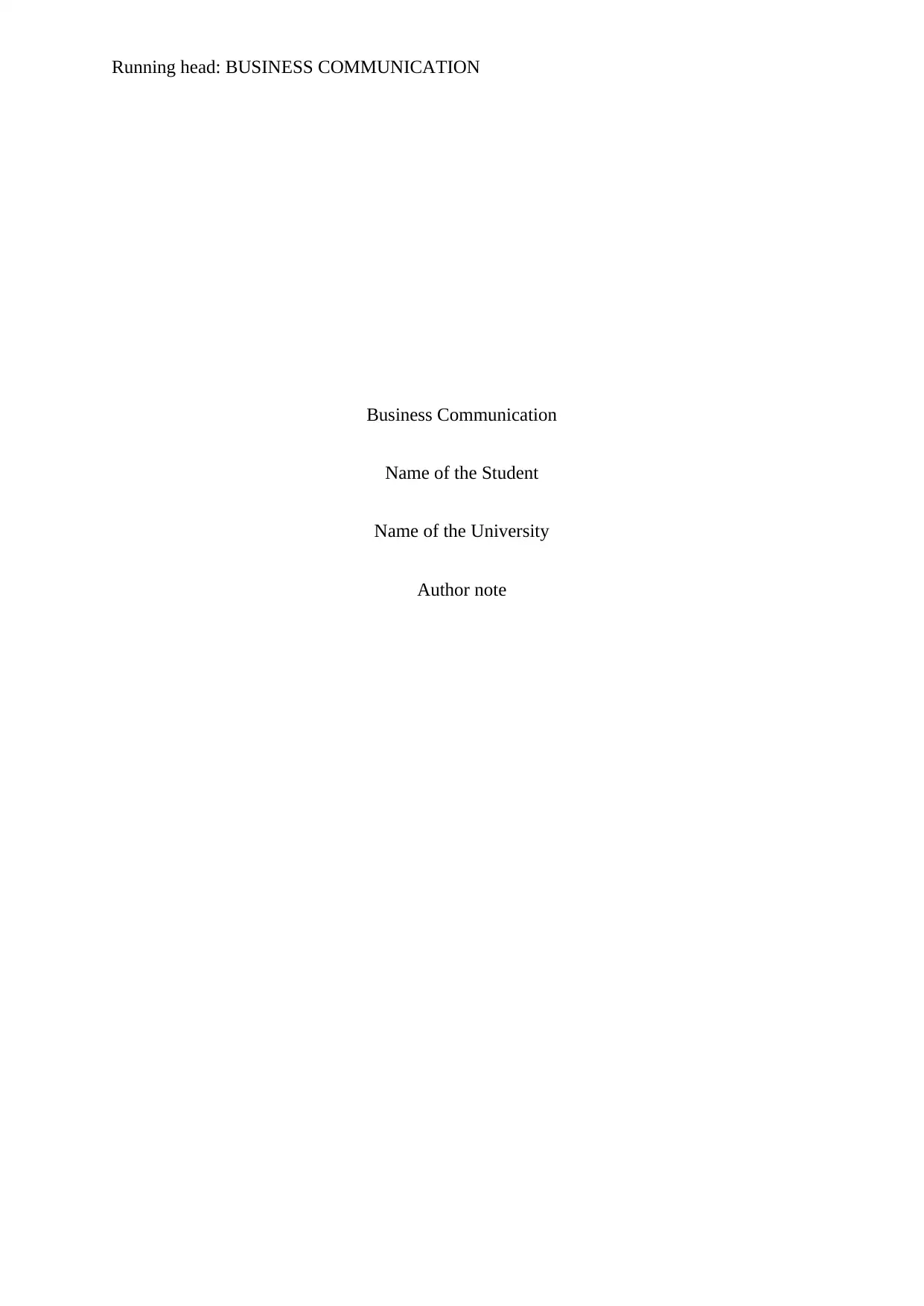
Running head: BUSINESS COMMUNICATION
Business Communication
Name of the Student
Name of the University
Author note
Business Communication
Name of the Student
Name of the University
Author note
Paraphrase This Document
Need a fresh take? Get an instant paraphrase of this document with our AI Paraphraser
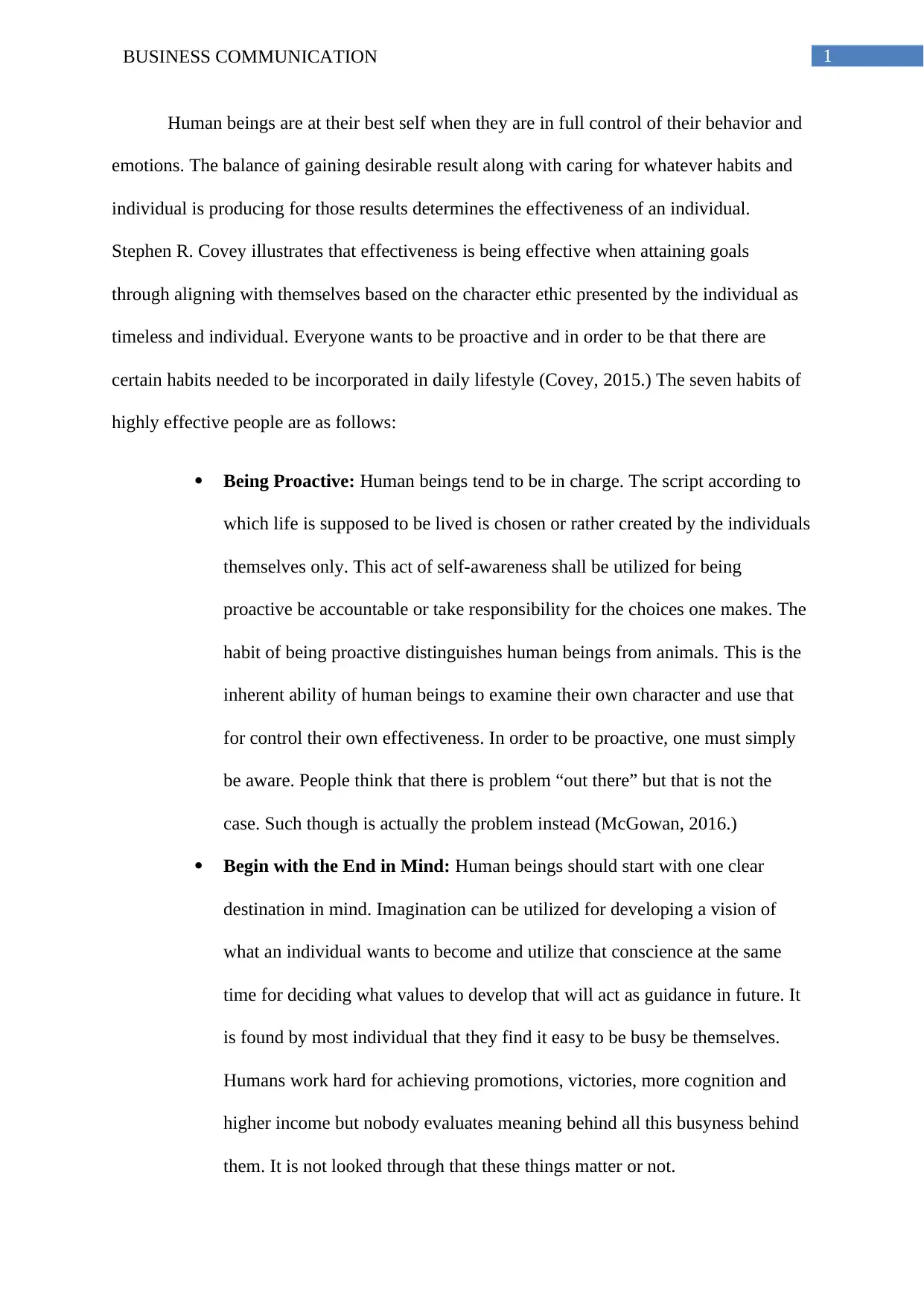
1BUSINESS COMMUNICATION
Human beings are at their best self when they are in full control of their behavior and
emotions. The balance of gaining desirable result along with caring for whatever habits and
individual is producing for those results determines the effectiveness of an individual.
Stephen R. Covey illustrates that effectiveness is being effective when attaining goals
through aligning with themselves based on the character ethic presented by the individual as
timeless and individual. Everyone wants to be proactive and in order to be that there are
certain habits needed to be incorporated in daily lifestyle (Covey, 2015.) The seven habits of
highly effective people are as follows:
Being Proactive: Human beings tend to be in charge. The script according to
which life is supposed to be lived is chosen or rather created by the individuals
themselves only. This act of self-awareness shall be utilized for being
proactive be accountable or take responsibility for the choices one makes. The
habit of being proactive distinguishes human beings from animals. This is the
inherent ability of human beings to examine their own character and use that
for control their own effectiveness. In order to be proactive, one must simply
be aware. People think that there is problem “out there” but that is not the
case. Such though is actually the problem instead (McGowan, 2016.)
Begin with the End in Mind: Human beings should start with one clear
destination in mind. Imagination can be utilized for developing a vision of
what an individual wants to become and utilize that conscience at the same
time for deciding what values to develop that will act as guidance in future. It
is found by most individual that they find it easy to be busy be themselves.
Humans work hard for achieving promotions, victories, more cognition and
higher income but nobody evaluates meaning behind all this busyness behind
them. It is not looked through that these things matter or not.
Human beings are at their best self when they are in full control of their behavior and
emotions. The balance of gaining desirable result along with caring for whatever habits and
individual is producing for those results determines the effectiveness of an individual.
Stephen R. Covey illustrates that effectiveness is being effective when attaining goals
through aligning with themselves based on the character ethic presented by the individual as
timeless and individual. Everyone wants to be proactive and in order to be that there are
certain habits needed to be incorporated in daily lifestyle (Covey, 2015.) The seven habits of
highly effective people are as follows:
Being Proactive: Human beings tend to be in charge. The script according to
which life is supposed to be lived is chosen or rather created by the individuals
themselves only. This act of self-awareness shall be utilized for being
proactive be accountable or take responsibility for the choices one makes. The
habit of being proactive distinguishes human beings from animals. This is the
inherent ability of human beings to examine their own character and use that
for control their own effectiveness. In order to be proactive, one must simply
be aware. People think that there is problem “out there” but that is not the
case. Such though is actually the problem instead (McGowan, 2016.)
Begin with the End in Mind: Human beings should start with one clear
destination in mind. Imagination can be utilized for developing a vision of
what an individual wants to become and utilize that conscience at the same
time for deciding what values to develop that will act as guidance in future. It
is found by most individual that they find it easy to be busy be themselves.
Humans work hard for achieving promotions, victories, more cognition and
higher income but nobody evaluates meaning behind all this busyness behind
them. It is not looked through that these things matter or not.
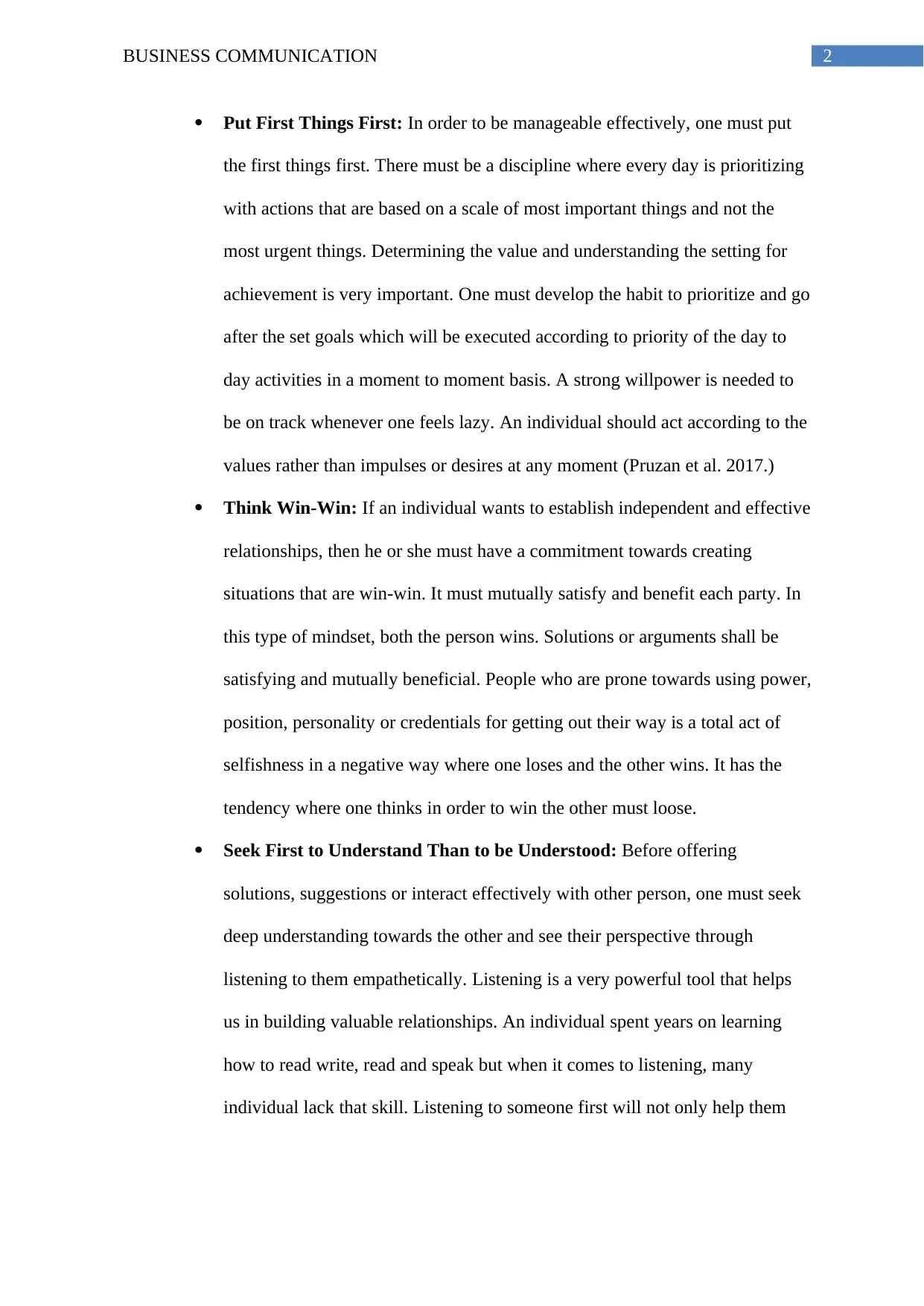
2BUSINESS COMMUNICATION
Put First Things First: In order to be manageable effectively, one must put
the first things first. There must be a discipline where every day is prioritizing
with actions that are based on a scale of most important things and not the
most urgent things. Determining the value and understanding the setting for
achievement is very important. One must develop the habit to prioritize and go
after the set goals which will be executed according to priority of the day to
day activities in a moment to moment basis. A strong willpower is needed to
be on track whenever one feels lazy. An individual should act according to the
values rather than impulses or desires at any moment (Pruzan et al. 2017.)
Think Win-Win: If an individual wants to establish independent and effective
relationships, then he or she must have a commitment towards creating
situations that are win-win. It must mutually satisfy and benefit each party. In
this type of mindset, both the person wins. Solutions or arguments shall be
satisfying and mutually beneficial. People who are prone towards using power,
position, personality or credentials for getting out their way is a total act of
selfishness in a negative way where one loses and the other wins. It has the
tendency where one thinks in order to win the other must loose.
Seek First to Understand Than to be Understood: Before offering
solutions, suggestions or interact effectively with other person, one must seek
deep understanding towards the other and see their perspective through
listening to them empathetically. Listening is a very powerful tool that helps
us in building valuable relationships. An individual spent years on learning
how to read write, read and speak but when it comes to listening, many
individual lack that skill. Listening to someone first will not only help them
Put First Things First: In order to be manageable effectively, one must put
the first things first. There must be a discipline where every day is prioritizing
with actions that are based on a scale of most important things and not the
most urgent things. Determining the value and understanding the setting for
achievement is very important. One must develop the habit to prioritize and go
after the set goals which will be executed according to priority of the day to
day activities in a moment to moment basis. A strong willpower is needed to
be on track whenever one feels lazy. An individual should act according to the
values rather than impulses or desires at any moment (Pruzan et al. 2017.)
Think Win-Win: If an individual wants to establish independent and effective
relationships, then he or she must have a commitment towards creating
situations that are win-win. It must mutually satisfy and benefit each party. In
this type of mindset, both the person wins. Solutions or arguments shall be
satisfying and mutually beneficial. People who are prone towards using power,
position, personality or credentials for getting out their way is a total act of
selfishness in a negative way where one loses and the other wins. It has the
tendency where one thinks in order to win the other must loose.
Seek First to Understand Than to be Understood: Before offering
solutions, suggestions or interact effectively with other person, one must seek
deep understanding towards the other and see their perspective through
listening to them empathetically. Listening is a very powerful tool that helps
us in building valuable relationships. An individual spent years on learning
how to read write, read and speak but when it comes to listening, many
individual lack that skill. Listening to someone first will not only help them
⊘ This is a preview!⊘
Do you want full access?
Subscribe today to unlock all pages.

Trusted by 1+ million students worldwide
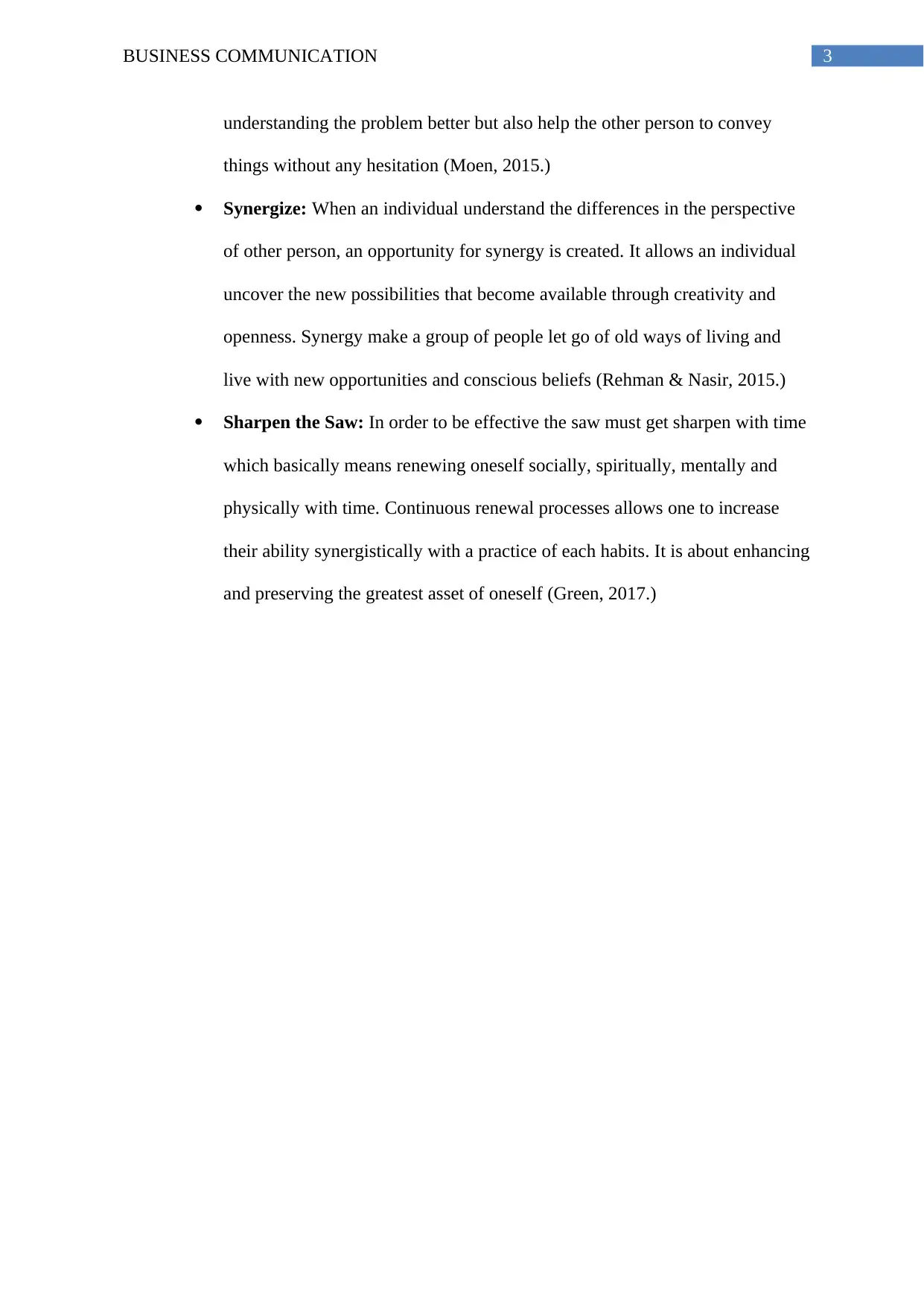
3BUSINESS COMMUNICATION
understanding the problem better but also help the other person to convey
things without any hesitation (Moen, 2015.)
Synergize: When an individual understand the differences in the perspective
of other person, an opportunity for synergy is created. It allows an individual
uncover the new possibilities that become available through creativity and
openness. Synergy make a group of people let go of old ways of living and
live with new opportunities and conscious beliefs (Rehman & Nasir, 2015.)
Sharpen the Saw: In order to be effective the saw must get sharpen with time
which basically means renewing oneself socially, spiritually, mentally and
physically with time. Continuous renewal processes allows one to increase
their ability synergistically with a practice of each habits. It is about enhancing
and preserving the greatest asset of oneself (Green, 2017.)
understanding the problem better but also help the other person to convey
things without any hesitation (Moen, 2015.)
Synergize: When an individual understand the differences in the perspective
of other person, an opportunity for synergy is created. It allows an individual
uncover the new possibilities that become available through creativity and
openness. Synergy make a group of people let go of old ways of living and
live with new opportunities and conscious beliefs (Rehman & Nasir, 2015.)
Sharpen the Saw: In order to be effective the saw must get sharpen with time
which basically means renewing oneself socially, spiritually, mentally and
physically with time. Continuous renewal processes allows one to increase
their ability synergistically with a practice of each habits. It is about enhancing
and preserving the greatest asset of oneself (Green, 2017.)
Paraphrase This Document
Need a fresh take? Get an instant paraphrase of this document with our AI Paraphraser
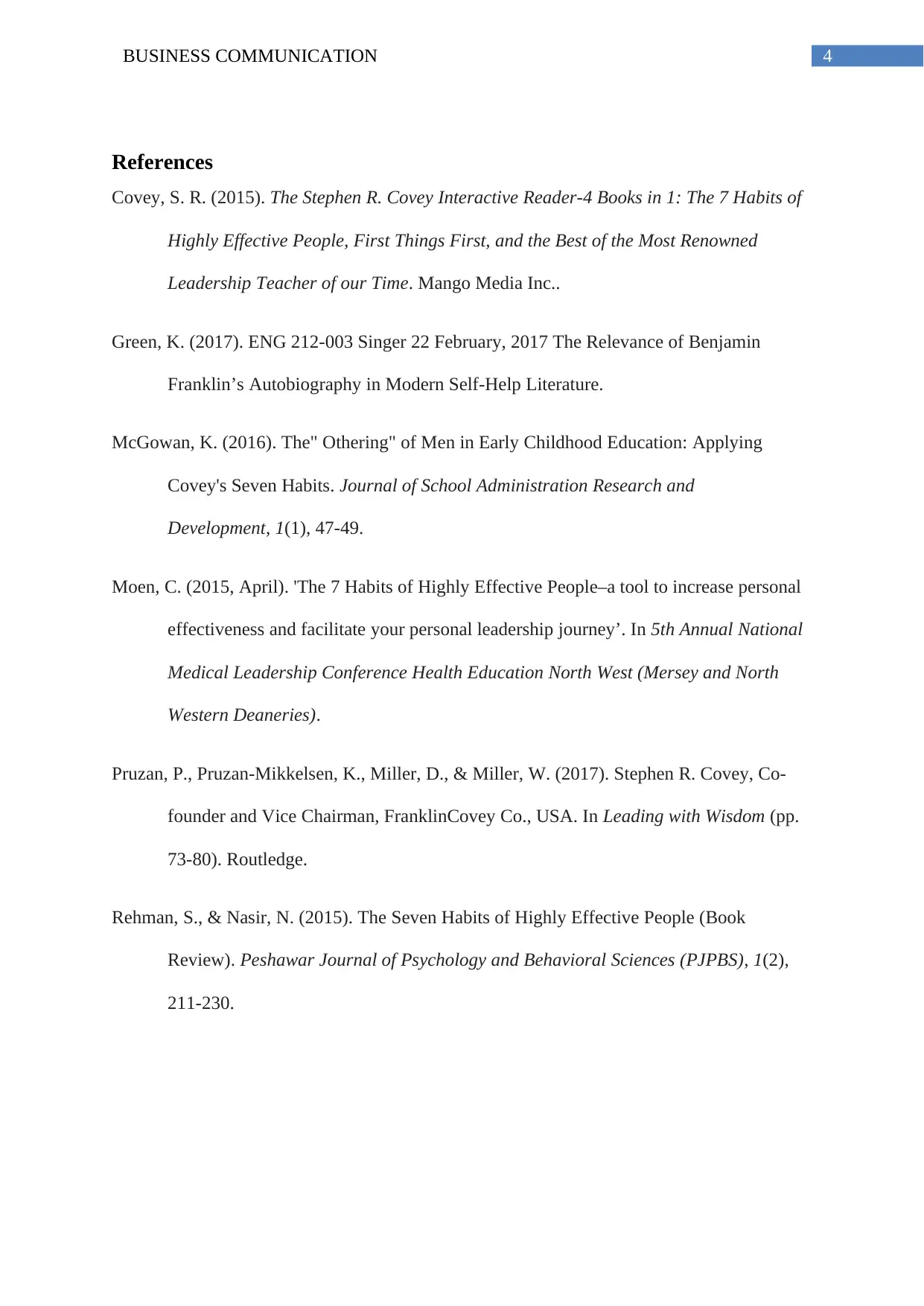
4BUSINESS COMMUNICATION
References
Covey, S. R. (2015). The Stephen R. Covey Interactive Reader-4 Books in 1: The 7 Habits of
Highly Effective People, First Things First, and the Best of the Most Renowned
Leadership Teacher of our Time. Mango Media Inc..
Green, K. (2017). ENG 212-003 Singer 22 February, 2017 The Relevance of Benjamin
Franklin’s Autobiography in Modern Self-Help Literature.
McGowan, K. (2016). The" Othering" of Men in Early Childhood Education: Applying
Covey's Seven Habits. Journal of School Administration Research and
Development, 1(1), 47-49.
Moen, C. (2015, April). 'The 7 Habits of Highly Effective People–a tool to increase personal
effectiveness and facilitate your personal leadership journey’. In 5th Annual National
Medical Leadership Conference Health Education North West (Mersey and North
Western Deaneries).
Pruzan, P., Pruzan-Mikkelsen, K., Miller, D., & Miller, W. (2017). Stephen R. Covey, Co-
founder and Vice Chairman, FranklinCovey Co., USA. In Leading with Wisdom (pp.
73-80). Routledge.
Rehman, S., & Nasir, N. (2015). The Seven Habits of Highly Effective People (Book
Review). Peshawar Journal of Psychology and Behavioral Sciences (PJPBS), 1(2),
211-230.
References
Covey, S. R. (2015). The Stephen R. Covey Interactive Reader-4 Books in 1: The 7 Habits of
Highly Effective People, First Things First, and the Best of the Most Renowned
Leadership Teacher of our Time. Mango Media Inc..
Green, K. (2017). ENG 212-003 Singer 22 February, 2017 The Relevance of Benjamin
Franklin’s Autobiography in Modern Self-Help Literature.
McGowan, K. (2016). The" Othering" of Men in Early Childhood Education: Applying
Covey's Seven Habits. Journal of School Administration Research and
Development, 1(1), 47-49.
Moen, C. (2015, April). 'The 7 Habits of Highly Effective People–a tool to increase personal
effectiveness and facilitate your personal leadership journey’. In 5th Annual National
Medical Leadership Conference Health Education North West (Mersey and North
Western Deaneries).
Pruzan, P., Pruzan-Mikkelsen, K., Miller, D., & Miller, W. (2017). Stephen R. Covey, Co-
founder and Vice Chairman, FranklinCovey Co., USA. In Leading with Wisdom (pp.
73-80). Routledge.
Rehman, S., & Nasir, N. (2015). The Seven Habits of Highly Effective People (Book
Review). Peshawar Journal of Psychology and Behavioral Sciences (PJPBS), 1(2),
211-230.
1 out of 5
Related Documents
Your All-in-One AI-Powered Toolkit for Academic Success.
+13062052269
info@desklib.com
Available 24*7 on WhatsApp / Email
![[object Object]](/_next/static/media/star-bottom.7253800d.svg)
Unlock your academic potential
Copyright © 2020–2025 A2Z Services. All Rights Reserved. Developed and managed by ZUCOL.





